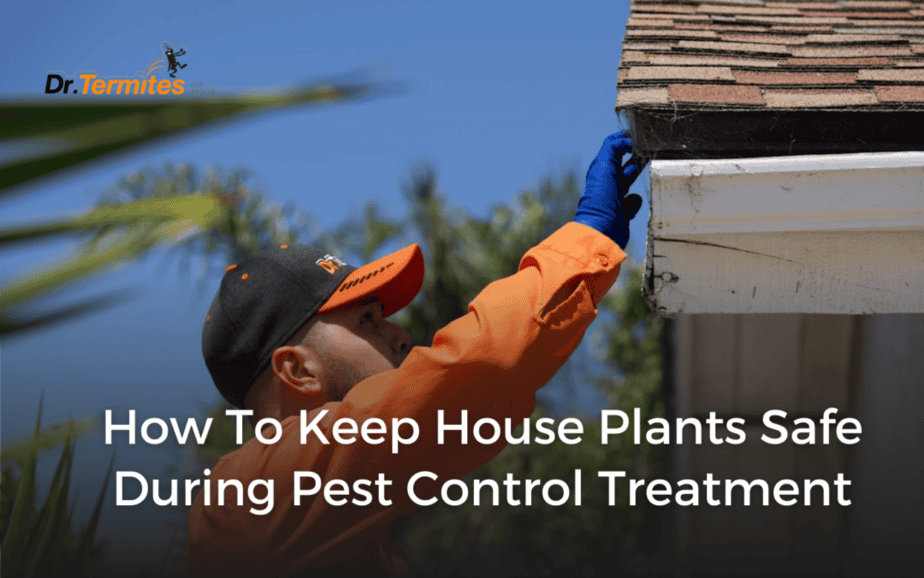
by pestcontrolseos | Apr 11, 2024 | Pest Conrol
Bringing Mother Nature inside our homes can make our living space more comfortable and beautiful. But, greenery isn’t just flowers and plants. Certain types can attract and house ants, spiders, and roaches. These creatures can be potentially harmful to plants, humans, and pets.
The best way to keep our plants and homes safe at the same time is through professional pest control treatment.
Pest control can help in maintaining a healthy and comfortable environment. They’re also safe for plants, humans, and pets when safety protocols are followed. The same experts use EPA-approved products and practice targeted application methods to minimize your exposure and maximize its effect on pests.
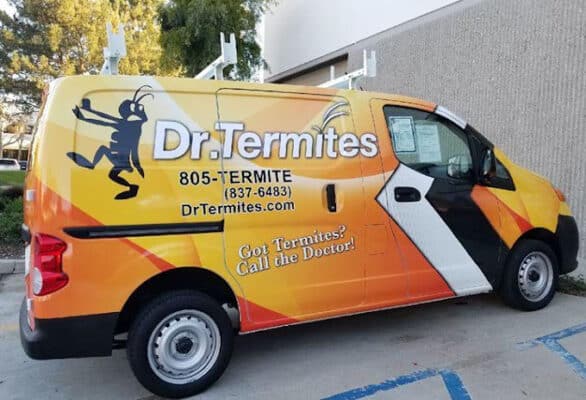
Common Misconceptions About Pest Control and House Plants
Many believe that pest control is harmful to the environment and our health. To some extent, it’s true. However, working with a seasoned veteran in the pest control industry eliminates those risks.
Here are more common misconceptions homeowners might have about the effects of pest control on houseplants.
Pest Control Is Harmful to Plants
Pest control companies now use modern products designed to target specific pests. If applied correctly, they’re generally safe for plants.
Pest Control Is Too Harsh for Delicate Houseplants
Depending on the areas affected, professionals can recommend alternative courses of action to protect your plant collection. This may include using a different but more appropriate method or a localized solution.
Plants Die If You Get Pest Control
This is not true! In many cases, keeping pests out of your home can benefit your plants. Eliminating harmful insects that can damage leaves and spread diseases is good for flowers and plants.
How to Protect Your Plants Before Pest Removal
As a homeowner, there are several steps that you can take to prepare your houseplants before the specialists arrive.
This includes:
- Make a detailed list of the types of houseplants inside your home. Let them know about any specific concerns you might have about the procedure and its potential effects on sensitive plants.
- Be open to temporarily relocating sensitive plants to safer areas while they work. In fact, suggest other suitable locations around your home if possible.
- Advise them on proper care of your houseplants during relocation.
- For plants that you can’t move, cover them with a plastic sheet or a loose cloth. Make sure they have proper ventilation. This can minimize their exposure to the chemicals without putting them at risk of bad air circulation.
- Ask pest control professionals when it’s safe to remove the covers on your houseplants, if applicable.
- Depending on the type of houseplant, you may consider watering them more thoroughly a day or two before they are exposed to the product.
- Avoid pruning or repotting your houseplants in the days before or after the scheduled date to minimize stress.
The Unexpected Benefits of Pest Control for Healthy Plants
Believe it or not, pest control is beneficial for houseplants.
These are some of the direct and indirect benefits of a pest-free home for your plant babies:
- Elimination of Plant Pests – Mealybugs, aphids, and spider mites are fatal to plants in cases of severe infestations.
- Improved plant health – By eliminating pests, your plants can focus on growing healthy without disease.
- Long-term plant protection – With proper application, the right chemicals can create a barrier around your home. This protects you, your family, your pets, and even your plants from future pest infestations. This promotes a healthier indoor environment for your entire dwelling.
Work Only With Reputable Pest Companies
When looking for a reputable and licensed contractor, you should prioritize the following considerations:
- Certifications and licensing
- Positive customer reviews
- Use of EPA-approved products
- Proper safety practices
Furthermore, the right partner will have no trouble answering your questions and concerns. If anything, they will encourage you to let them know about your current home situation. This is what allows them to give better recommendations best suited for your houseplants and their needs.
But, as a homeowner, you also have a set of responsibilities. You need to follow all pre-treatment and post-treatment instructions carefully.
By keeping an open and clear line of communication, you can minimize the risk of the procedure on your houseplants.
Conclusion
Your home is a sanctuary. It’s your private abode. It’s where you should be most comfortable. The presence of pests can change this. If you’ve been hesitant about professional pest solutions because of your reservations about their potential dangers to your houseplants, this is your chance to change your mind.
Professional pest control treatment is key to keeping your home safe, healthy, and free from bugs, mites, ticks, fleas, and other unsanitary creatures.
When applied correctly by a licensed pest exterminator, the chemicals used are safe for the environment, your family, pets, and plants while keeping your home pest-free. As an added benefit, keeping unwanted pests away from your house promotes the health and well-being of your houseplants as well.
At Dr. Termites, we understand that your houseplants are part of the family. We will work closely with you to find the safest way to solve your pest problem.
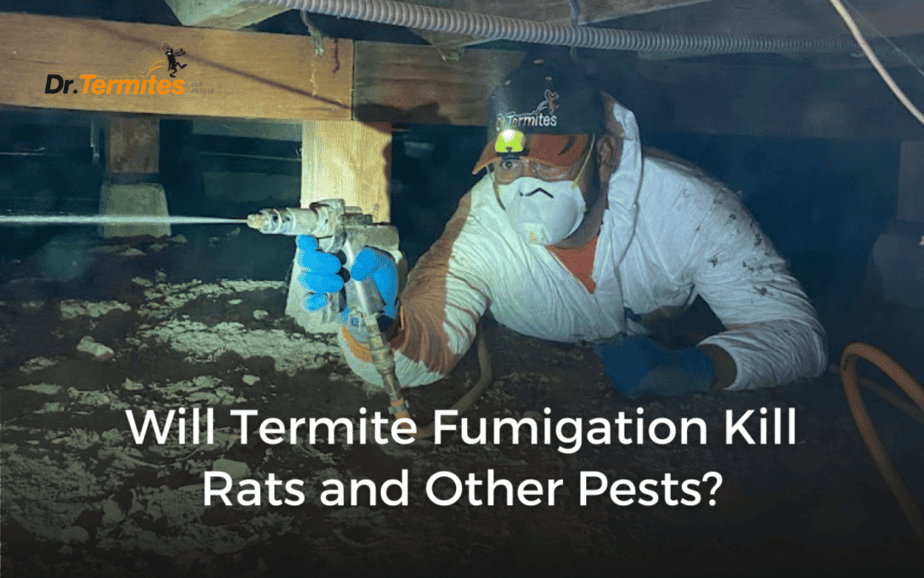
by pestcontrolseos | Apr 4, 2024 | Blog, Pest Conrol
When homeowners consider termite control, their primary concern is to protect their property from the destructive power of termites. However, homes are ecosystems that harbor various pests, including rodents like rats.
The question arises: Can the process used to eradicate termites also impact rats and additional unwanted creatures? This blog post examines the efficacy of termite fumigation in dealing with rats and other pests, providing a comprehensive overview of what homeowners can expect.
The Essence of Termite Fumigation
What is Termite Fumigation?
Termite fumigation, a pest control technique, employs gas pesticides to eliminate termites in infested structures. It’s highly effective for extensive, hidden infestations, as it reaches termites in areas otherwise inaccessible. This method ensures that even the most secluded termites are targeted, providing a comprehensive solution to termite problems.
How Does It Work?
The fumigation process involves enclosing the infested structure, often with a tent, before introducing a fumigant gas. This gas is allowed to permeate the structure for 24 to 72 hours, reaching into cracks, crevices, and wood where termites reside. This method ensures that the termites are effectively eradicated, providing a thorough solution to termite infestation by targeting their hidden sanctuaries and eliminating them completely.
Impact on Rats and Other Pests
Will Rats Be Affected?
Rats, as mammals, differ physiologically from insects such as termites. Fumigation gasses lethal to termites might not always be as effective against rats. However, if rats are inside a structure during termite fumigation, the high concentration of fumigant needed to exterminate termites could also prove fatal to rats. This highlights the importance of considering all occupants of a structure when planning fumigation treatments.
Other Pests and Considerations
Termite fumigation targets not just termites and rats but also household pests like cockroaches, bedbugs, and ants. However, its effectiveness depends on the pest’s lifecycle and fumigant concentration. To fully eradicate a range of pests, it’s often essential to employ additional, targeted pest control techniques. This ensures a comprehensive approach to pest management, addressing various life stages and species for more effective control.
Factors Influencing Fumigation Effectiveness
Sealing and Preparation
The effectiveness of fumigation in eliminating pests greatly depends on the quality of home sealing and preparation prior to commencement. Ensuring proper sealing is crucial as it guarantees the fumigant gas penetrates all possible pest-hiding places, significantly increasing the chances of a successful pest eradication process.
Concentration and Exposure Time
The effectiveness of fumigation largely depends on two critical factors: the concentration of the fumigant used and the duration of exposure. Utilizing higher concentrations and allowing for longer exposure periods significantly enhances the probability of eradicating a broader spectrum of pests, making these parameters essential for successful pest control efforts.
Integrated Pest Management (IPM)
A Holistic Approach
Integrated Pest Management (IPM) is a comprehensive approach that blends biological, cultural, physical, and chemical methods to reduce health, environmental, and financial risks. It emphasizes long-term prevention and control of various pests, such as termites and rats, aiming to achieve effective pest management while minimizing potential negative impacts. By adopting IPM strategies, we can efficiently address pest-related challenges in a sustainable and responsible manner.
Implementing IPM in Your Home
Effective pest management via Integrated Pest Management (IPM) starts with prevention. Homeowners should regularly maintain their homes to seal potential entry points and minimize moisture and clutter, which attract pests. It’s also crucial to monitor pest activity regularly. Early detection through monitoring allows for timely intervention, preventing small issues from escalating into severe infestations. Adopting these proactive measures ensures a healthier, pest-free home environment.
Maximizing Pest Control: The Role of Termite Fumigation and Integrated Pest Management Strategies
Termite fumigation is a powerful method for eradicating termites, and it can also impact rats and other pests present in the treated structure. However, its effectiveness varies depending on several factors, including the type of pest and the concentration of the fumigant. For comprehensive pest control, homeowners should consider Integrated Pest Management (IPM) strategies that address the broader spectrum of potential invaders. By combining preventive measures, regular monitoring, and targeted interventions, you can maintain a pest-free home, safeguarding your property and health.
At Dr. Termites, we specialize in offering holistic pest solutions that cater to the unique needs of your home. Our expertise in Integrated Pest Management (IPM) allows us to provide preventative strategies, precise monitoring, and targeted interventions designed to keep your home safe from termites, rats, and a variety of other pests.
Maintaining a pest-free environment is crucial for protecting your property and health. If you’re encountering pest issues or seeking to prevent future infestations, let Dr. Termites be your partner in pest control. Contact us today to schedule a consultation and learn how our services can bring peace of mind and lasting protection to your home.
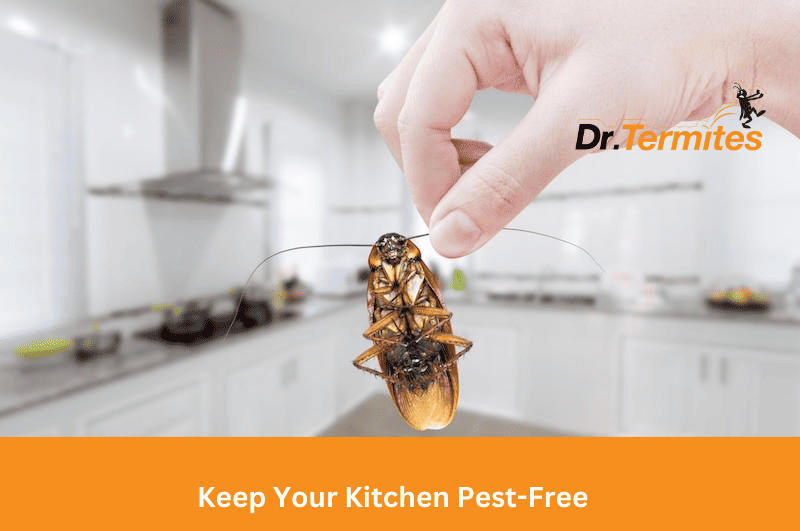
by pestcontrolseos | Jan 28, 2024 | Pest Conrol
A pest-free kitchen is beneficial to your health and necessary for upholding food safety regulations. In this post, we’ll go over some practical suggestions for how to keep your kitchen pest-free. We have covered everything from applicable pest-proofing procedures to using environmentally friendly cleaning solutions.
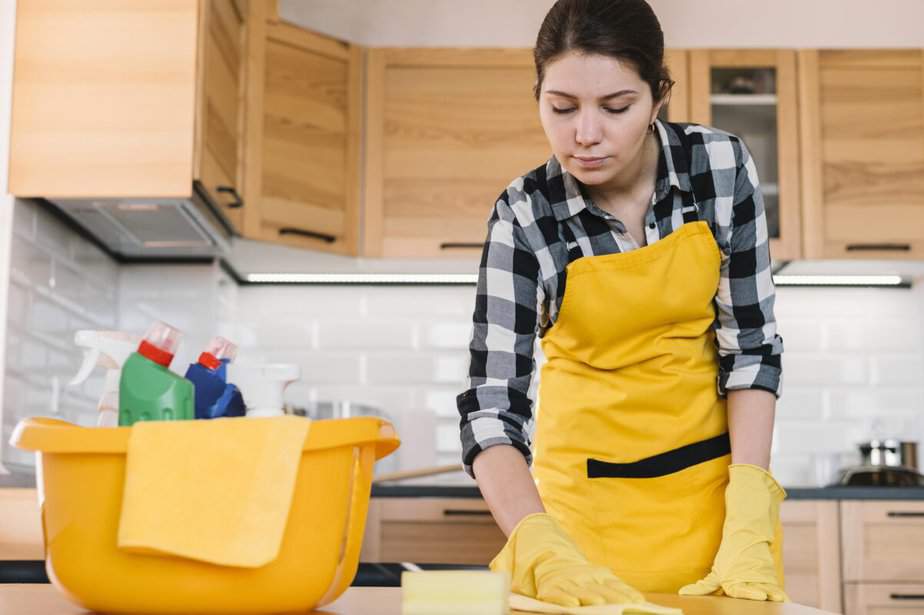
Pest-Proofing Your Kitchen
Installing a pest barrier is the first step in maintaining a hygienic kitchen environment. Implement the following strategies for pest-proofing your kitchen:
Seal Entry Points
Sealing any gaps or openings that pests may utilize to gain access to your home is critical. Focus on windows, doors, and pipe openings for a complete blockage that effectively keeps pests out. How to keep your kitchen pest-free includes doing this.
Proper Food Storage
Storing food in sealed containers creates a barrier that prevents pests from accessing your food supply. It helps keep your food fresh and serves as a deterrent, inhibiting bugs from staying owing to a lack of simple access.
Regular Cleaning Routine
Maintain a consistent cleaning regimen, including hard-to-reach areas behind appliances and cabinets, to create an environment that pests, including termites, rodents, and bed bugs, will avoid. Pay special attention to less apparent areas, such as behind appliances and cabinets, to create an atmosphere that pests will avoid.
Dispose of Garbage Properly
Regular waste disposal and sealed bins are crucial for proofing your kitchen. It keeps bugs from being attracted to the smell of food waste. Keeping the area around the bins clean helps to dissuade bugs from remaining in your environment. Proper garbage disposal is an integral part of how to keep your kitchen pest-free and protected against unwanted intruders.
Effective Cleaning Products For Pest Control
Keeping your kitchen clean is crucial, but choosing eco-friendly items that do not hurt the environment is also critical. Consider the following.
Natural Pest Repellents
By utilizing the power of nature, you can learn how to keep your kitchen pest-free. Natural deterrents such as mint oil, vinegar, or citrus peels can effectively deter bugs, resulting in a pest-free atmosphere that aligns with your eco-friendly values. Must Read: The Importance Of Regular Pest Inspections For Your Home
Eco-Friendly Disinfectants
You can learn how to keep your kitchen pest-free by making environmentally intelligent decisions. Choose eco-friendly or biodegradable cleaning products to prevent pests while minimizing environmental impact. These methods eliminate unwanted pests, ensuring a clean and sustainable living environment.
Chemical-Free Pest Control
Another way how to keep your kitchen pest-free is by using chemical-free pest control methods. Try using effective cleaning products like diatomaceous earth to keep bugs away. It won’t harm people or pets but is awful for insects. This way, you can have a bug-free home without putting your family or the environment at risk.
Maintaining Food Safety And Sustainability
Ensure your kitchen is not only pest-free but also adheres to sustainable practices:
Waste Reduction
Efficiently managing food resources is critical for environmental health. To reduce food waste, embrace sustainable cooking practices and create a positive impact by composting organic kitchen trash, which provides a green disposal solution.
Smart Water Usage
Be cautious of how much water you use while doing home activities. When washing dishes, use a basin to conserve water and quickly rectify any leaks, ensuring that every drop contributes to a more environmentally friendly approach to water management.
Energy-Efficient Appliances
Consider switching to more energy-efficient equipment to increase your environmental responsibilities. These assist in reducing your carbon footprint and promoting a healthier planet by conserving energy and making your daily activities more environmentally conscious.
FAQS:
What attracts pests to the kitchen?
Food and water attract pests into kitchens. Leftover crumbs, spills, and unsealed food serve as an open invitation. Keep your kitchen clean, store food in airtight containers, and address leaks as soon as possible to make it less tempting to unwelcome guests.
Are open containers more inviting to kitchen pests?
Open containers can attract pests. Bugs and creatures enjoy easy access to food, and empty containers provide an all-you-can-eat buffet. Keep everything sealed to deter bugs.
Conclusion
Safeguarding your kitchen from pests is more than ensuring food safety—it’s a commitment to a healthier and greener world! Bid farewell to these annoying visitors by implementing clever pest-proofing techniques and enlisting the help of eco-friendly cleaning warriors. Together, let’s transform our kitchens into bug-free, eco-friendly havens! Seize control with expert advice from Dr. Termites, your trusted ally in environmentally responsible pest treatment. Get ready to reclaim your kitchen with us and embrace a pest-free, ecologically sustainable future!



































